I’m here today to talk about attention. Do I have yours?
Attention is the ability to focus on something – whether your own thoughts, a task at hand, an image where you are trying to find Waldo, or a whiny, tinny sound you juuuust can’t quite make out. We attend to things all the time — there’s so many things around — so much so that sometimes things are vying for our attention — the report we have to write, the hum of the air conditioner behind us, the squeal of tires on the pavement, the dog nudging our knee… you get it. People can attend to more than one thing at once; while you’re driving you take in visual information about the road ahead, around and behind, and audio information about who is where and what sounds are present, and are planning your trip and where to go and the next turn while also maybe even singing along to the radio! It just works sometimes. Then, there’s selective attention, or choosing to focus intently on some sole thing. Trying to drown out the sound of a roommate singing in the shower so we can focus on threading that damn needle. When we selectively attend to something, it’s at the expense of other things — when I’m focusing on listening to someone’s story, I have to not attend to my itchy nose, or the temperature of the air around me, or the sound of birds outside of the window.
Sometimes, attention gets a little wonky.
There are bottlenecks and filters and rules that determine how much we can attend to and remember at a time — we have a thing called working memory that allows us to retain and attend to some sort of short bit of information for a little while. We can only store so many numbers at a time — about the length of a phone number, as it happens. We can only focus on so many sensory stimuli at a time — I may be noticing that my leg hurts and totally forget about how annoying my back feels while sitting in this position. And the brain trips up: we go in the kitchen and forget why we were there in the first place; we drive to work and then think, wait, I don’t even remember the drive here; someone introduces themselves to us and we literally immediately forget their name. Isn’t the brain great!

Sometimes inattention can get to the point where it’s diagnosable. We call this Attention Deficit/Hyperactivity Disorder, or ADHD. You’ve likely heard of it. In 2012, the Centers for Disease Control and Prevention (CDC) reported that 11% of American children aged 2 to 17 have ADHD, and 4.4% of adults present with ADHD, although this number is believed to be under-reported due to adults seeking care less, or being diagnosed less.
The diagnostic criteria for ADHD (as laid out in the Diagnostic and Statistical Manual of Mental Disorders, 5th edition) are as follows:
A persistent pattern of inattention and/or hyperactivity-impulsivity that interferes with functioning or development, as characterized by (A) and/or (B):
A. Inattention: Six (or more) of the following symptoms have persisted for at least 6 months to a degree that is inconsistent with developmental level and that negatively impacts directly on social and academic/occupational activities:
Note: The symptoms are not solely a manifestation of oppositional behavior, defiance, hostility, or failure to understand tasks or instructions. For older adolescents and adults (age 17 and older), at least five symptoms are required.
- Often fails to give close attention to details or makes careless mistakes in schoolwork, at work, or during other activities (e.g., overlooks or misses details, work is inaccurate).
- Often has difficulty sustaining attention in tasks or play activities (e.g., has difficulty remaining focused during lectures, conversations, or lengthy reading).
- Often does not seem to listen when spoken to directly (e.g., mind seems elsewhere, even in the absence of any obvious distraction).
- Often does not follow through on instructions and fails to finish schoolwork, chores, or duties in the workplace (e.g., starts tasks but quickly loses focus and is easily sidetracked).
- Often has difficulty organizing tasks and activities (e.g., difficulty managing sequential tasks; difficulty keeping materials and belongings in order; messy, disorganized work; has poor time management; fails to meet deadlines).
- Often avoids, dislikes, or is reluctant to engage in tasks that require sustained mental effort (e.g., schoolwork or homework; for older adolescents and adults, preparing reports, completing forms, reviewing lengthy papers).
- Often loses things necessary for tasks or activities (e.g., school materials, pencils, books, tools, wallets, keys, paperwork, eyeglasses, mobile telephones).
- Is often easily distracted by extraneous stimuli (for older adolescents and adults, may include unrelated thoughts).
- Is often forgetful in daily activities (e.g., doing chores, running errands; for older adolescents and adults, returning calls, paying bills, keeping appointments).
B. Hyperactivity and impulsivity: Six (or more) of the following symptoms have persisted for at least 6 months to a degree that is inconsistent with developmental level and that negatively impacts directly on social and academic/occupational activities:
Note: The symptoms are not solely a manifestation of oppositional behavior, defiance, hostility, or a failure to understand tasks or instructions. For older adolescents and adults (age 17 and older), at least five symptoms are required.
- Often fidgets with or taps hands or feet or squirms in seat.
- Often leaves seat in situations when remaining seated is expected (e.g., leaves his or her place in the classroom, in the office or other workplace, or in other situations that require remaining in place).
- Often runs about or climbs in situations where it is inappropriate. (Note: In adolescents or adults, may be limited to feeling restless.)
- Often unable to play or engage in leisure activities quietly.
- Is often “on the go,” acting as if “driven by a motor” (e.g., is unable to be or uncomfortable being still for extended time, as in restaurants, meetings; may be experienced by others as being restless or difficult to keep up with).
- Often talks excessively.
- Often blurts out an answer before a question has been completed (e.g., completes people’s sentences; cannot wait for turn in conversation).
- Often has difficulty waiting his or her turn (e.g., while waiting in line).
- Often interrupts or intrudes on others (e.g., butts into conversations, games, or activities; may start using other people’s things without asking or receiving permission; for adolescents and adults, may intrude into or take over what others are doing).
C. Several inattentive or hyperactive-impulsive symptoms were present prior to age 12 years.
D. Several inattentive or hyperactive-impulsive symptoms are present in two or more settings (e.g., at home, school, or work; with friends or relatives; in other activities).
E. There is clear evidence that the symptoms interfere with, or reduce the quality of, social, academic, or occupational functioning.
F. The symptoms do not occur exclusively during the course of schizophrenia or another psychotic disorder and are not better explained by another mental disorder (e.g., mood disorder, anxiety disorder, dissociative disorder, personality disorder, substance intoxication or withdrawal).
Does any of this sound familiar? I’m sure literally anyone reading this can relate to the trials and tribulations of human attention, which sometimes comes and goes like the wind. However, attentional deficits become diagnosable when they directly impact a person’s social, academic, or occupational life. Yes, I can be a scatterbrain. When it causes me to keep losing jobs, relationships, or my car (dude)? Not so much.
There is a weird underbelly to ADHD that is not as well known — symptoms that are related but not listed in the DSM-5 as official diagnostic criteria. A huge one present in folks managing attentional deficits is procrastination. It’s hard to organize tasks, so they all kind of happen at once, halfway, or you get bogged down in even trying to plan things that you get so overwhelmed that you just can’t, and end up feeling like a dumpster fire. Or you can hyperfocus on something so well that the whole day passes and you “forgot” to do the things you needed to do. ADHD doesn’t mean — Squirrel! — that you can’t focus on anything… it just means, sometimes, you can’t appropriately direct your spotlight of attentional power to things that matter. Even when they really, really matter.
Sometimes, ADHD symptoms can increase symptoms of anxiety (“Oh my God I have that paper due tomorrow but I can’t bring myself to even think of it!”), depression (“I am a worthless failure and I will never get anything accomplished”), mood swings (“I got really angry really fast but then it just went away”), and relational problems (such as feeling really, really sensitive to criticism or perceived rejection from others).
By the way, diagnosis is a strange animal. You and I have both googled stuff and been told we have cancer, probably way too many times (damn you, WebMD!). The fact of the matter is, you cannot be diagnosed through an internet article (not even this one, I’m sad to say). That has to happen in the presence of a licensed medical professional like a doctor, therapist, or psychiatrist.
ADHD diagnosis is criticized as overdiagnosis — that is, it happens too much. This occurs mainly in criticisms of ADHD diagnosis and medication prescription in school-aged children — as fate would have it, humans were not made to sit at tiny desks for 8 hours a day without incident. Especially small humans. So problems abound there as children, of course, have attentional and behavioral problems in a strict school environment. As a mental healthcare practitioner who almost exclusively sees adults, in the population I manage, ADHD is likely underdiagnosed. Folks are fearful of admitting problems which can be attributed to self blame, personal failures, or laziness; people are also just unaware of ADHD as a diagnosis, or are afraid to seem like they are seeking drugs, or plain just don’t think it’s a problem that can be “fixed” or managed.
I am not a practitioner who prescribes medication for ADHD — I use psychotherapeutic modalities to manage symptoms — talk therapy, cognitive behavioral therapy, NLP, and mindfulness, to name a few (I won’t bore you with this, I know you’re trying hard to pay attention). Folks can use medication to manage symptoms. And, they can incorporate a series of behavioral adaptations into their life to allow themselves to focus attention here or there to get tasks done.
It’s also important to remember that environmental influences can have a huge impact on mental health, functioning, and well-being, too.
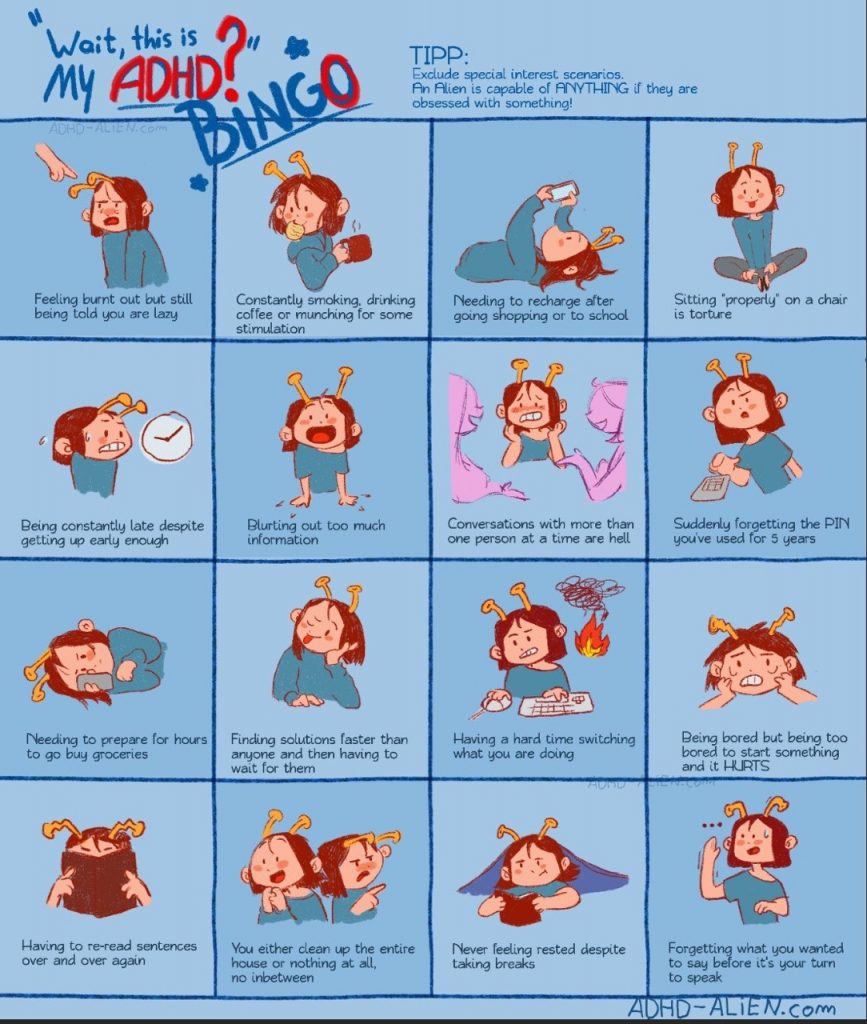
I’ve actually been meaning to write this article (or any article, it’s been a bit) for a while. Guess what? I procrastinated. Yes, I am someone who has been diagnosed with ADHD. It plagued my life for a long while — I tried to understand for so long why I was literally unable to do tasks that should have been so easy or accessible (looking at you, school readings), and yet I could play The Sims for literally 12 hours without standing up, eating, or other normal bodily functions. I previously thought it was my fault, and that I wasn’t trying hard enough, or that I was lazy, or dumb.
For me personally, having an understanding and a diagnosis meant that I could place my behaviors and feelings into a context. Oh, I forgot your name literally immediately as you told me? I am not a bad friend. Sometimes, Brain is forgetful. Oh, I lost my wallet for the thousandth time? I am not dumb. I just need to relax and it will come to me (I literally last misplaced my wallet in a taco bell bag in my fridge — I’m normal, I promise). Oh, xyz thing happened and I reacted quickly by getting really excited/loud/angry/hurt? Oops, just gotta be more patient and mindful in the future.
I was afraid to talk about this with a doctor because I blamed myself, and I was afraid to look like I was just trying to get some drugs. Well guess what — I received human compassion and understanding, and you can, too. If you find you struggle with this stuff, I totally recommend you speak about it with a trusted loved one, or a medical professional. Or both. It feels quite cathartic to be told you’re actually OK and things aren’t your fault. For me, having that better understanding allowed me to be more kind, compassionate, and patient with myself. It allowed me to develop behavioral coping strategies, like being absolutely militant with myself in putting my wallet and keys in the exact same place every day. Or excusing my inattention with others and making space to focus on conversations in spaces absent of other ambient noises. Or writing to-do lists and checking off boxes, or carrying a journal with me, or texting myself reminders and setting alarms. Or practicing mindfulness to give my brain a rest and space to relax. Not all management of ADHD has to be medication-based. You are welcome and encouraged to work with yourself instead of against yourself for behavioral solutions to mental health stuff.
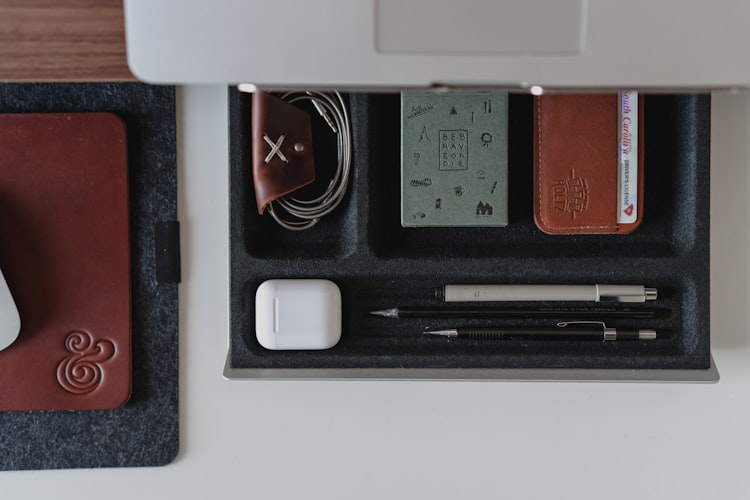
Kindness and self-compassion are the most important, in my opinion. I have been procrastinating on writing more. Guess what — we are in the midst of a global pandemic. Of course we are all stressed out more. Nothing needs to get done right away. I encourage you to understand your procrastination, your attentional abilities, your work ethic, etc. as a sign of the times, in context. Because I’m sure in the greater context, you are a great human honestly just trying your best.
2022 update — Some further resources are included below.
2 Replies to “Attention and Procrastination”
Comments are closed.